A father in Gaza, Mahmoud Abdul Rahman Ahmed, expresses profound grief and outrage after his son was killed in an Israeli strike while searching for water. The attack, which tragically claimed the lives of ten civilians, including multiple children, has heightened international scrutiny on the ongoing conflict and the humanitarian crisis in the region.
Tragic Water Point Strike in Gaza Sparks Outrage and Calls for Action

Tragic Water Point Strike in Gaza Sparks Outrage and Calls for Action
Following a heartbreaking incident where Israeli airstrikes killed children at a water distribution point in Gaza, calls escalate for accountability and an end to violence.
In a devastating incident that has drawn international attention, a father from Gaza is mourning the loss of his son, Abdullah, who was killed in an Israeli airstrike while attempting to collect water. On Sunday morning, ten individuals were reportedly killed at a water distribution point in the Nuseirat refugee camp, a location populated by displaced persons affected by the ongoing conflict.
Mahmoud Abdul Rahman Ahmed recounted the day his son went out with other children and families, jerrycans in hand, seeking to quench their thirst. “That area was inhabited by displaced people, others who were exhausted by the war,” he shared in an interview, emphasizing the serious humanitarian issues facing residents in the camp. “The children stood in queues with empty stomachs... Minutes after gathering, warplanes struck without prior notice.”
The strike has been confirmed by Al-Awda hospital in Nuseirat, which reported that along with Abdullah, six other children were among the deceased, raising grave concerns over the safety of civilians amidst ongoing military operations. Following this incident, the Israeli military stated that the strike was aimed at a "terrorist" but admitted a "technical error" caused the ammunition to miss the target.
Mahmoud, holding the Israeli military accountable, contended that the strike served as a deliberate message: that even the most basic need—drinking water—was being obstructed. His grief extended beyond loss, pointing to a disrupted childhood: “They were looking at reality with the hope of it changing.”
Despite claims of military error from Israel, the UN warned that water shortages in Gaza are worsening due to a combination of military operations and limitations imposed by the ongoing blockade. Sam Rose, acting director for the UN agency for Palestinian refugees (Unrwa), noted that families are receiving inadequate water supplies, intensifying the humanitarian crisis.
UN officials lamented the frequency of civilian casualties, with reports indicating a classroom of children killed daily in the conflict. Catherine Russell from UNICEF condemned these incidents as "horrific," urging Israel to reassess its military engagement policies to ensure compliance with international humanitarian standards.
As the UN Security Council prepares to discuss the plight of children in Gaza, arguments continue to emerge regarding accountability. Israeli representatives assert that Hamas bears responsibility for the plight of Palestinian children by using them as shields within the conflict. However, many, including Mahmoud, argue for Israeli accountability: “This war needs to stop... We are civilians just like others in the world.”
The heartbreaking event highlights the urgent need for a resolution to the ongoing violence, as innocent lives continue to be lost in the escalating humanitarian crisis in Gaza.




















